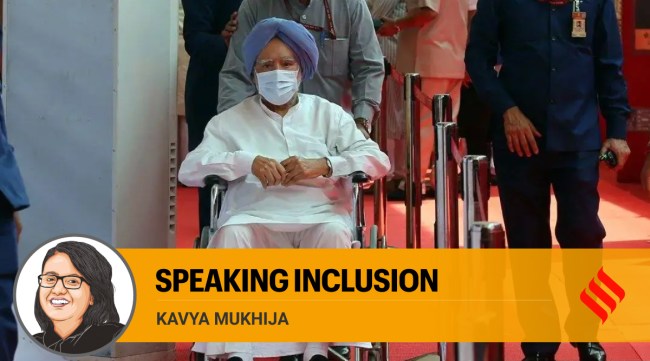Opinion Speaking Inclusion: Ableist language further marginalises people with disabilities
For long, people with disabilities have either been patronised or seen as objects of pity. This has given rise to euphemisms, like “specially-abled” or “differently-abled”
 Former prime minister Manmohan Singh at the Parliament House. (Express File Photo)
Former prime minister Manmohan Singh at the Parliament House. (Express File Photo) A recent article published in The Indian Express (‘Ex-PM Manmohan Singh shifted to last row in Rajya Sabha for easy movement in wheelchair’, February 2) used the term “wheelchair-bound”. This is an example of ableism in language. A wheelchair helps a person with a mobility impairment move around, so why would a wheelchair “bind” a person? A wheelchair or any mobility aid doesn’t restrict a person; rather it makes them independent by helping them move freely. Hence, a person who uses a wheelchair is not “wheelchair-bound”, but just a “wheelchair-user”.
Exclusive language is one of the components of ableism — the differential treatment people with disabilities experience because of their disabilities. It is rooted in the medical model of disability — the assumption that people with disabilities have to be fixed to fit into society. Ableism sees disability negatively against the “ideal” non-disabled society. This language of exclusion directly affects people with disabilities. Portrayals in media further reinforce myths, widening the gap between persons with and without disabilities.
For long, people with disabilities have either been patronised or seen as objects of pity. This has given rise to euphemisms, like “specially-abled” or “differently-abled”. Unfortunately, due to their widespread usage in the public domain, many people think that these are the correct terms.
Take the term “differently-abled”. When I first heard it in class 5, I felt happy. The only term for people with disabilities that I was familiar with then was “physically challenged” or “handicapped”. Given my own reluctance to accept my disabled identity, I could relate to it.
A few years down the line, I switched sides. I betrayed my internalised ableism and shook hands with my disabled identity. I learnt that I’m a “person with a disability” and not someone who’s specially or differently-abled. What is a special or different ability, after all? Though these terms seem positive, the disability community is not accepting of them. They may make the user feel “good” while talking about disability, but that feeling usually comes from a negative attitude towards disability itself.
Language isn’t just a means of communication — it’s a medium of change. It can be used to influence thoughts, actions and behaviours, and pave the way for a better world. In fact, when we use inclusive language, we “see” the person over everything else — including their disabilities. It makes them feel like they’re not just their disability. This is also why one mustn’t start a conversation by asking someone about their disability.
Ableism in language is evident in many ways. For example, saying “I’m too OCD” or using words like “lame”, “crazy”, or “stupid”: All of us have used these terms without realising that they may be inappropriate to some people, such as those living with disabilities. Terms like “crazy”, “stupid”, “hysterical” or “OCD” are often associated with people with psychosocial disabilities. When we use such terms lightly, we reveal our dismissive attitudes and biases.
How about terms like “deaf” or “blind”? Though it might seem that we’re being disrespectful to people with visual disabilities when we call them “blind”, we’re actually addressing them the right way because a disability is only one of their identities. This is known as identity-first language as opposed to person-first language, which puts the person first (as in a “person” with a disability). But it is always a good decision to ask people what they are comfortable with.
The media is in a position to influence public opinion and establish societal norms. Hence, an appropriate representation of disability in the media can help raise awareness and counter stigma and misinformation. It has the power to shape perceptions, thereby enabling the integration of persons with disabilities into the mainstream in the right way. The best way forward is to converse with people with disabilities to understand the nuances of the experiences within the community. Just as we bid adieu to some old-fashioned words, it’s time we retire ableist terms from our vocabulary.
The writer is a wheelchair user, job coach at v-shesh and NCPEDP-Javed Abidi Fellow at NCPEDP. This is part of a series, ‘Dear Editor, I Disagree’, a fortnightly column in which we invite readers to tell us why, when they differ with the editorial positions or news coverage of The Indian Express





